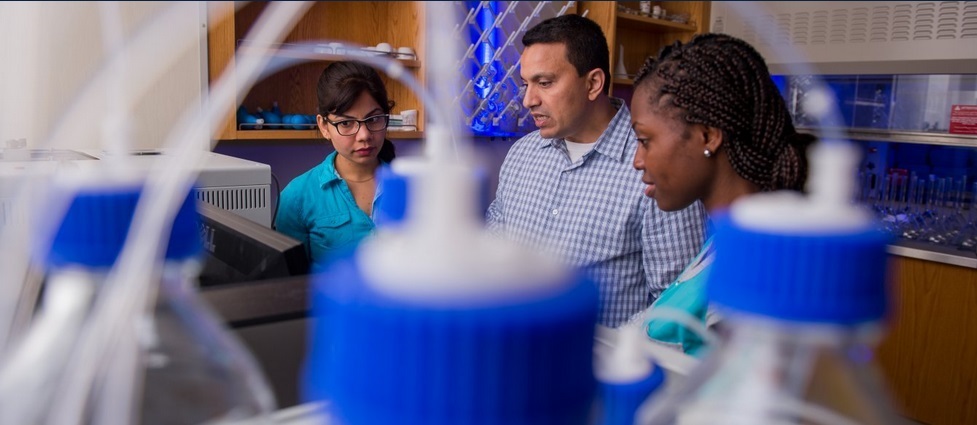| |
| |
Feb 11, 2026
|
|
|
|
|
2023-2024 Undergraduate Catalog [Archived Catalog]
Chemistry (B.S.)
|
|
 Return to: Programs Sorted Alphabetically Return to: Programs Sorted Alphabetically

 
.png)
Program Coordinator/Contact
Brian Logue, Department Head
Melody Jewell, Coordinator of Undergraduate Programs
Department of Chemistry, Biochemistry and Physics
Avera Health and Science Center 247, Box 2202
605-688-5151
Program Information
Chemistry is often referred to as the central science because of its strong connections to the other natural sciences and mathematics. Chemistry is therefore an area of study that allows students vast opportunity to explore the unknown and to address some of society’s most pressing scientific problems. Professional chemists are employed in a number of diverse fields: governmental policymakers, pharmaceutical and industrial chemists, intellectual property attorneys, high school teachers, and physicians. The curriculum reaches both the breadth and depth of the discipline. Students take a foundational course in each of the five subdisciplines (analytical, biochemistry, inorganic, organic, and physical chemistry) and advanced courses in these subdisciplines based on the student’s individual interests and career goals. Undergraduate training in chemistry at SDSU provides students with enhanced critical-thinking skills and problem-solving abilities, attributes that are highly desired in the modern workforce. The chemistry major is also excellent preparation for professional study in medicine, dentistry, business, and law. The American Chemical Society (ACS), in recognition of the quality and rigor of the curriculum, certifies the B.S. degree in chemistry offered by the Department. In addition to completing the degree requirements listed below, students engage in independent research projects in collaboration with departmental faculty; this capstone experience affords students a means to apply the knowledge of the discipline to questions for which the answers are unknown.
Accreditation, Certification, and Licensure
The B.S. in Chemistry is certified by the American Chemical Society (ACS), whose certification serves as recognition of a high quality and rigorous curriculum.
Course Delivery Format
Courses offered in the B.S. Chemistry curriculum are taught in a variety of formats which address student learning outcomes. Didactic (lecture) methods ensure the development of foundational knowledge of chemistry. Practical (laboratory) methods ensure the development of laboratory skills and training. A combination of didactic and practical methods ensures the successful completion of the undergraduate research project.
|
Student Learning Outcomes
Upon completing a B.S. in Chemistry, graduates will: - Understand the basic concepts fundamental to chemistry.
- Be properly prepared for laboratory investigations.
- Develop in-depth knowledge of at least four of the five subdisciplines of chemistry (analytical, biochemistry, inorganic, organic, and physical).
- Demonstrate knowledge of modern chemistry topics, which could include catalysis, environmental chemistry, green/sustainable chemistry, materials science, and toxicology.
- Be able to design and execute experiments, analyze data, and use the chemical literature.
- Be able to synthesize the curricular knowledge and skills in a capstone (research) experience.
- Understand the scientific process and develop problem-solving skills.
- Retrieve information effectively.
- Develop chemical safety skills.
- Be able to rely on collaboration, effective teamwork, safety, and ethical practices.
- Learn professional ethics.
- Have proficiency in essential green chemistry competencies.
- Be able to assess, comprehend, and communicate science.
Academic Requirements
A grade of “C” or better is required in all courses required for the major. Requirements for Chemistry Major: 120 Credits
Bachelor of Science System General Education Requirements
Department of Chemistry, Biochemistry and Physics Requirements
- Capstone course in the major discipline
- Upper division coursework Credits: 33
Advanced Chemistry Electives
Select from the following courses: Credits: 9 Electives
Taken as needed to complete any additional degree requirements. Emphases
Within the major, electives may be selected to develop a multidisciplinary emphasis area. Students who wish to pursue multidisciplinary emphasis should consult their academic advisor early in their academic career to plan courses and electives in support of the intended multidisciplinary emphasis. Total Required Credits: 120
Notes
1 CHEM 498 - Research (COM) - The required undergraduate research project must be chemistry or biochemistry related for a minimum of four credits. The research credits are to be completed over the course of at least two semesters. CHEM 498 credit is given for the research that is completed during the semester or summer. CHEM 490 is reserved for completing a written paper of the research project and presenting the paper to the department in the semester after the project is completed. Students are still encouraged to present their research at a regional or national meeting. Refer to the department for information about additional summer research experiences. Summary of Program Requirements
Bachelor of Science | | System General Education Requirements* | 25 Credit Hours | | Major Requirements | 48 Credit Hours | | Supporting Coursework | 18 Credit Hours | | Electives** | 29 Credit Hours | *System General Education Requirements for students pursuing a baccalaureate degree shall include a minimum of 30 credit hours. Some general education coursework may be counted for Major Requirements and Supporting Coursework.
**Taken as needed to complete any additional degree requirements. Academic Advising Guide Sheet
The goal of the academic advising guide sheets and sample plans of study is to promote undergraduate student success by guiding all students to timely completion of an undergraduate degree. Students are not limited to the course sequence provided for their academic program. Instead, the sample plan of study is one possible path to completing your degree and is meant to be used as a guide for planning purposes in consultation with an academic advisor. The plans also help students prepare for meetings with their academic advisor and track their progress in their selected academic program. |
 Return to: Programs Sorted Alphabetically Return to: Programs Sorted Alphabetically
|
|
|